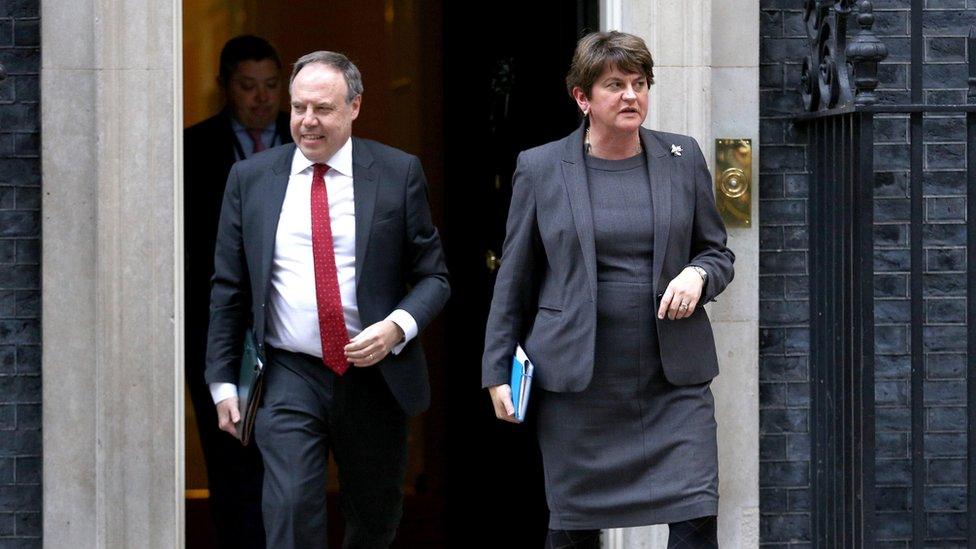Brexit: The problem that could undo the fragile deal
- Published

DUP leader Arlene Foster and her deputy Nigel Dodds met the PM in Downing Street this week
Boris Johnson has managed to achieve what he was repeatedly told was impossible.
The withdrawal agreement was, after all, able to be opened up again.
The backstop, after all, was changed - although some of its principles remain in the form of Northern Ireland having some different customs rules and regulations to the rest of the UK.
And there is, after all that, a way of finding a route out of those special arrangements in the shape of votes in the Northern Ireland Assembly - Stormont.
A miracle? Not quite.
The withdrawal agreement is not "dead" as he promised Brexiteers, but in the words of one former minister briefed on the shape of the deal, he has managed to "perform some major surgery on it".
And with a fateful sense of deja vu, there is a big problem in the form of the DUP, who - as things stand - are not yet on board.
They might face criticism for being stubborn, for holding things up in the face of huge political pressure when a whole continent appears on the verge of signing a deal.
But what they see as a legitimate concern is the proposed way of getting out of Northern Ireland's proposed relationship with the EU - those votes in Stormont - would give too much power to Sinn Fein, the nationalist party who are much more pro EU.
They fear being outvoted by the other parties, who might well want to linger in the closer relationship with the bloc, will change the political gravity there.
Over time, the fear is it would anchor Northern Ireland closer to Dublin than London, which for a unionist party is a grave risk.
Put simply by a DUP insider this morning, "we can't sell this at home".
'Summit time'
What we don't know yet is whether the DUP's resistance can be smoothed over by tweaks to the deal in the next 24 hours at the summit.
These big meetings are a special time zone of their own - in summit time, treaty problems can melt away or new ones can rear their ugly, obstructive heads.
Yet what Theresa May discovered to her cost is that concerns from the DUP can't be wished away.
If Boris Johnson were to try to bounce them, he may come to regret it. And their votes matter so much because they are totem for Brexiteers at Westminster too.
At the risk of sounding like a broken record, nothing is agreed until everything is agreed.
The prime minister has no majority so he cannot just ignore the criticisms and push on.
This morning's unsurprising developments are a reminder of one of the truths of this whole process, as put by a former Brexit minister: "To deliver in Brussels, the UK must compromise - but to deliver in Parliament, the UK cannot compromise in Brussels."
That's the problem that could be the undoing of this fragile deal.
